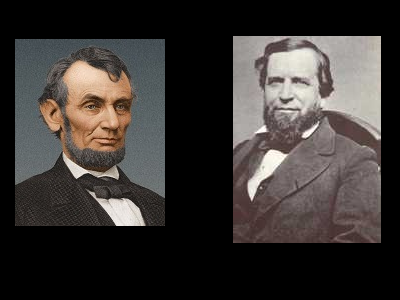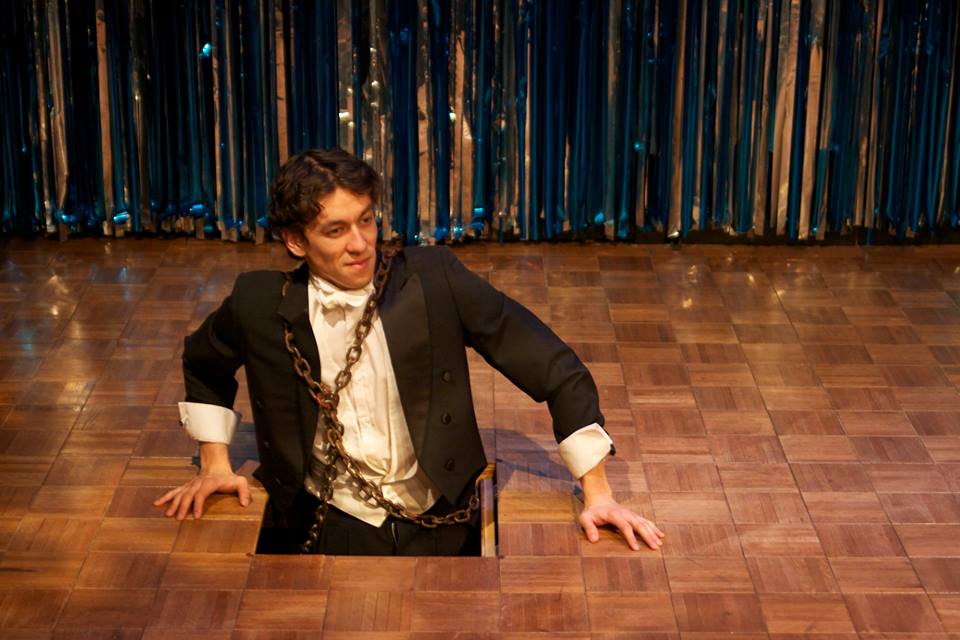Lincoln in Louisville
By David S. Taub, Jr.
Directed by Vin Morreale Jr.
Review by Keith Waits
Entire contents copyright © 2015 by Keith Waits. All rights reserved
Abraham Lincoln and Joshua Speed. As much as has been written about Lincoln, the years of close friendship with Louisville native Speed have arguably only been given a spotlight by scholars of Kentucky history. Of course, there is that whole theory about Lincoln and Speed being gay that, while obviously provocative, seems thin; another attempt to co-opt the greatest U.S. President into contemporary social movements.
Perhaps writer David S. Taub, Jr. wrote this play in response to that theory: to counter such misunderstanding with a glimpse into a key moment in the relationship between the two men. It’s a smart choice to limit the subject in this way, a technique that has become a potent trend in historical biography; use one brief period as a lens into the subject’s character and to foreshadow future greatness.
Louisville is often cited as a seminal moment in Lincoln’s growing antipathy towards slavery, and a visit to the Speed family plantation, Farmington, brings him in closer proximity to the vicious discipline and dehumanizing attitudes of the “stinking business” than ever before. As he witnesses his old friend engage in beating a house slave named Rose for attempting to run away, the bonds between the two are stretched to the point of breaking.
I’m not certain how much of the story is true. In his program notes, Traub allows that he has taken liberties but maintains that his story is true to the spirit of the future 16th President’s time in Louisville. That seems fair enough, but the particulars are weighed down by cliché and a pedantic tone that squanders the full potential of the tale. History records, and the play echoes, that Lincoln came to Farmington at a low point in his life, following a rupture in his relationship with Mary Todd, and that this time of healing places him in confrontation with the ugly side of his best friend’s lifestyle is a sound dramatic premise, but the overly earnest text seems more an academic lesson than a full-blooded drama.
Scott Davis gives the younger Abraham Lincoln a distracted air that breaks with convention, while Daniel Smith makes Joshua Speed a stentorian figure: stiff and formal. The contrast is interesting and helps give us a fresh take on the most famous and important U.S. President. Colette Delaney brings her brisk professionalism to Mary Speed, whose flirtation with Lincoln is surprisingly complex. Teresa Wentzel as their mother Lucy Fry Speed is a flinty snob, R. Wayne Hougue, Jr. as their brother James is brash but underdeveloped. Courtney Cleveland struggles to bring life to Rose, and the script’s better moments center around her: exchanges with Lincoln are the most subtle parts of the writing, although the familiarity they develop arguably stretches credulity. Keith McGill is more successful at explicating the complexity of another Farmington slave, Morroco; a character that also traverses the cliche of a slave and something more nuanced. Traub’s greatest success may be in the development of these two characters.
The play is of average length, but the late entry of another historical figure, Anton Heinrich, is a welcome injection of energy in Sean Childress’s nicely judged performance, despite the fact that he relates very little to the play’s main themes. His somewhat arbitrary presence might feel like deus ex machina intervention except that he isn’t that impactful as a character.
Lincoln in Louisville may play well for history buffs, and the exploration of a little-known incident in the life of such an icon figure holds undeniable value, even if the production fails to fully realize that potential.
Lincoln In Louisville
June 4 – 7, 2015
The Alley Theater
615 West Main Street
Louisville, Kentucky 40202
502-713-6178
Alleytheater.org
 [box_light]Keith Waits is a native of Louisville who works at Louisville Visual Art during the days, including being one of the hosts of PUBLIC on ARTxFM, but spends most of his evenings indulging his taste for theatre, music and visual arts. His work has appeared in Pure Uncut Candy, TheatreLouisville, and Louisville Mojo. He is now Managing Editor for Arts-Louisville.com.[/box_light]
[box_light]Keith Waits is a native of Louisville who works at Louisville Visual Art during the days, including being one of the hosts of PUBLIC on ARTxFM, but spends most of his evenings indulging his taste for theatre, music and visual arts. His work has appeared in Pure Uncut Candy, TheatreLouisville, and Louisville Mojo. He is now Managing Editor for Arts-Louisville.com.[/box_light]




